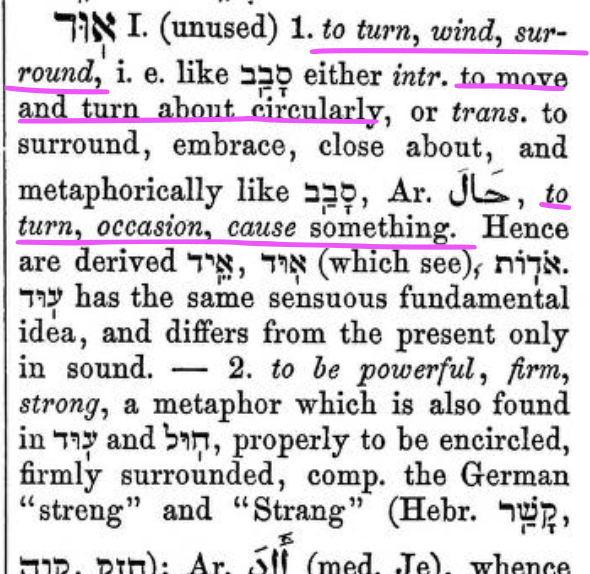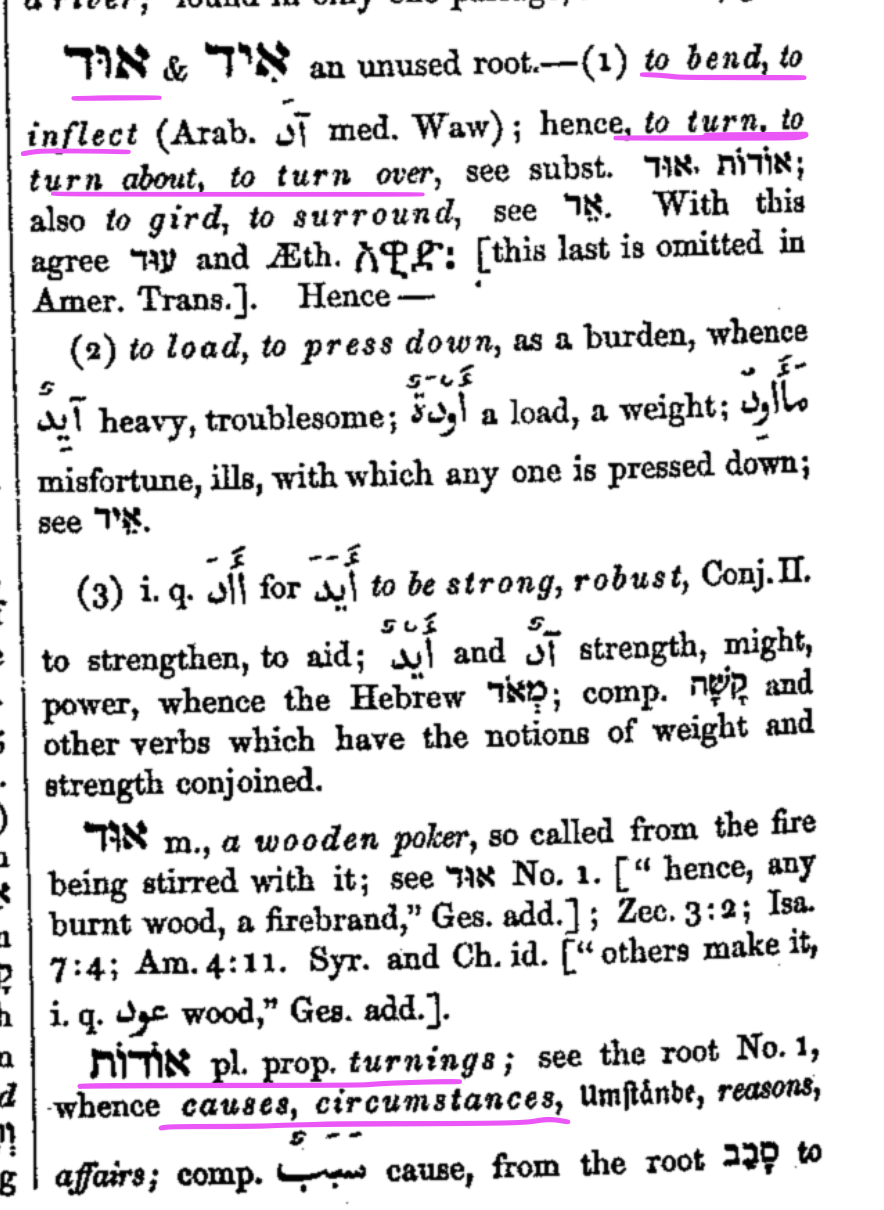 Psalms 42:6
Psalms 42:6

None
Definition: link
Root: None
Exhaustive: None
mâh
Definition: properly, interrogative what? (including how? why? when?); but also exclamation, what! (including how!), or indefinitely what (including whatever, and even relatively, that which); often used with prefixes in various adverbial or conjunctive senses
Root: or מה; or מ; or מ; also מה; a primitive particle;
Exhaustive: or מה; or מ; or מ; also מה; a primitive particle; properly, interrogative what? (including how? why? when?); but also exclamation, what! (including how!), or indefinitely what (including whatever, and even relatively, that which); often used with prefixes in various adverbial or conjunctive senses; how (long, oft, (-soever)), (no-) thing, what (end, good, purpose, thing), whereby(-fore, -in, -to, -with), (for) why.
None
Definition: separate
Root: None
Exhaustive: None
shâchach
Definition: to sink or depress (reflexive or causative)
Root: a primitive root;
Exhaustive: a primitive root; to sink or depress (reflexive or causative); bend, bow (down), bring (cast) down, couch, humble self, be (bring) low, stoop.
None
Definition: my, personal posessive - noun suffix: 1st person common singular
Root: None
Exhaustive: Personal posessive pronoun - suffix for nouns, adjectives and passive participles: 1st person singular
nephesh
Definition: properly, a breathing creature, i.e. animal of (abstractly) vitality; used very widely in a literal, accommodated or figurative sense (bodily or mental)
Root: from H5314 (נפש);
Exhaustive: from נפש; properly, a breathing creature, i.e. animal of (abstractly) vitality; used very widely in a literal, accommodated or figurative sense (bodily or mental); any, appetite, beast, body, breath, creature, [idiom] dead(-ly), desire, [idiom] (dis-) contented, [idiom] fish, ghost, [phrase] greedy, he, heart(-y), (hath, [idiom] jeopardy of) life ([idiom] in jeopardy), lust, man, me, mind, mortally, one, own, person, pleasure, (her-, him-, my-, thy-) self, them (your) -selves, [phrase] slay, soul, [phrase] tablet, they, thing, ([idiom] she) will, [idiom] would have it.
hâmâh
Definition: to make a loud sound (like English 'hum'); by implication, to be in great commotion or tumult, to rage, war, moan, clamor
Root: a primitive root (compare H1949 (הום));
Exhaustive: a primitive root (compare הום); to make a loud sound (like English 'hum'); by implication, to be in great commotion or tumult, to rage, war, moan, clamor; clamorous, concourse, cry aloud, be disquieted, loud, mourn, be moved, make a noise, rage, roar, sound, be troubled, make in tumult, tumultuous, be in an uproar.
None
Definition: sequential 'and'
Root: None
Exhaustive: Verbal vav: joined to verb with no intervening prefix (usually conversive) (future<->past)
None
Definition: me, personal pronoun - verb/prep. suffix: 1st person common singular
Root: None
Exhaustive: Personal object pronoun - suffix for propositions and verbs without an object: 1st person singular
ʻal
Definition: above, over, upon, or against (yet always in this last relation with a downward aspect) in a great variety of applications
Root: properly, the same as H5920 (על) used as a preposition (in the singular or plural often with prefix, or as conjunction with a particle following);
Exhaustive: properly, the same as על used as a preposition (in the singular or plural often with prefix, or as conjunction with a particle following); above, over, upon, or against (yet always in this last relation with a downward aspect) in a great variety of applications; above, according to(-ly), after, (as) against, among, and, [idiom] as, at, because of, beside (the rest of), between, beyond the time, [idiom] both and, by (reason of), [idiom] had the charge of, concerning for, in (that), (forth, out) of, (from) (off), (up-) on, over, than, through(-out), to, touching, [idiom] with.
yâchal
Definition: to wait; by implication, to be patient, hope
Root: a primitive root;
Exhaustive: a primitive root; to wait; by implication, to be patient, hope; (cause to, have, make to) hope, be pained, stay, tarry, trust, wait.
ʼĕlôhîym
Definition: gods in the ordinary sense; but specifically used (in the plural thus, especially with the article) of the supreme God; occasionally applied by way of deference to magistrates; and sometimes as a superlative
Root: plural of H433 (אלוה);
Exhaustive: plural of אלוה; gods in the ordinary sense; but specifically used (in the plural thus, especially with the article) of the supreme God; occasionally applied by way of deference to magistrates; and sometimes as a superlative; angels, [idiom] exceeding, God (gods) (-dess, -ly), [idiom] (very) great, judges, [idiom] mighty.
None
Definition: to, for
Root: None
Exhaustive: None
None
Definition: link
Root: None
Exhaustive: None
kîy
Definition: (by implication) very widely used as a relative conjunction or adverb (as below); often largely modified by other particles annexed
Root: a primitive particle (the full form of the prepositional prefix) indicating causal relations of all kinds, antecedent or consequent;
Exhaustive: a primitive particle (the full form of the prepositional prefix) indicating causal relations of all kinds, antecedent or consequent; (by implication) very widely used as a relative conjunction or adverb (as below); often largely modified by other particles annexed; and, + (forasmuch, inasmuch, where-) as, assured(-ly), + but, certainly, doubtless, + else, even, + except, for, how, (because, in, so, than) that, + nevertheless, now, rightly, seeing, since, surely, then, therefore, + (al-) though, + till, truly, + until, when, whether, while, whom, yea, yet.
ʻôwd
Definition: properly, iteration or continuance; used only adverbially (with or without preposition), again, repeatedly, still, more
Root: or עד; from H5749 (עוד);
Exhaustive: or עד; from עוד; properly, iteration or continuance; used only adverbially (with or without preposition), again, repeatedly, still, more; again, [idiom] all life long, at all, besides, but, else, further(-more), henceforth, (any) longer, (any) more(-over), [idiom] once, since, (be) still, when, (good, the) while (having being), (as, because, whether, while) yet (within).
None
Definition: him, personal pronoun - verb/prep. 3rd person masculine singular
Root: None
Exhaustive: Personal object pronoun - suffix for propositions and verbs without an object: 3rd person masculine singular
yâdâh
Definition: physically, to throw (a stone, an arrow) at or away; especially to revere or worship (with extended hands); intensively, to bemoan (by wringing the hands)
Root: a primitive root; used only as denominative from H3027 (יד); literally, to use (i.e. hold out) the hand;
Exhaustive: a primitive root; used only as denominative from יד; literally, to use (i.e. hold out) the hand; physically, to throw (a stone, an arrow) at or away; especially to revere or worship (with extended hands); intensively, to bemoan (by wringing the hands); cast (out), (make) confess(-ion), praise, shoot, (give) thank(-ful, -s, -sgiving).
yᵉshûwʻâh
Definition: something saved, i.e. (abstractly) deliverance; hence, aid, victory, prosperity
Root: feminine passive participle of H3467 (ישע);
Exhaustive: feminine passive participle of ישע; something saved, i.e. (abstractly) deliverance; hence, aid, victory, prosperity; deliverance, health, help(-ing), salvation, save, saving (health), welfare.
None
Definition: verseEnd
Root: None
Exhaustive: None
None
Definition: his, personal posessive - noun suffix: 3rd person masculine singular
Root: None
Exhaustive: Personal posessive pronoun - suffix for nouns, adjectives and passive participles: 3rd person masculine singular
pânîym
Definition: the face (as the part that turns); used in a great variety of applications (literally and figuratively); also (with prepositional prefix) as a preposition (before, etc.)
Root: plural (but always as singular) of an unused noun פנה; from H6437 (פנה));
Exhaustive: plural (but always as singular) of an unused noun פנה; from פנה); the face (as the part that turns); used in a great variety of applications (literally and figuratively); also (with prepositional prefix) as a preposition (before, etc.); [phrase] accept, a-(be-) fore(-time), against, anger, [idiom] as (long as), at, [phrase] battle, [phrase] because (of), [phrase] beseech, countenance, edge, [phrase] employ, endure, [phrase] enquire, face, favour, fear of, for, forefront(-part), form(-er time, -ward), from, front, heaviness, [idiom] him(-self), [phrase] honourable, [phrase] impudent, [phrase] in, it, look(-eth) (-s), [idiom] me, [phrase] meet, [idiom] more than, mouth, of, off, (of) old (time), [idiom] on, open, [phrase] out of, over against, the partial, person, [phrase] please, presence, propect, was purposed, by reason of, [phrase] regard, right forth, [phrase] serve, [idiom] shewbread, sight, state, straight, [phrase] street, [idiom] thee, [idiom] them(-selves), through ([phrase] -out), till, time(-s) past, (un-) to(-ward), [phrase] upon, upside ([phrase] down), with(-in, [phrase] -stand), [idiom] ye, [idiom] you.
ישועות - Salvations
Why are you bowing yourself down, soul of myself? And why are you are growling against myself? Hope/Wait for mighty ones! For he has replicated the cause of ourselves,1 salvations of the faces of himself!O my God, my soul will be bowed down upon me: for this I will remember from the land of Jordan and the Hermonites, from the mountain of smallness.
O my God, my soul is cast down within me; on account of this I remember You from Jordan-land and from the Hermons, from Mount Mizar.
Footnotes
| Psa. 42:6 | Psa. 42:6 Strong's #5749, עוד is a word often meaning "a going around, repetition, again"(as an adverb, Strong's #5750) but it is also a verb "to repeat/duplicate/do again" which is interpreted in various contexts as "testifying/bearing witness." The idea of duplicating and repeating as the primary meaning is generally overlooked since it doesn't fit into established traditional contexts. The phrase "Hope in God because" means that the following text should probably contain a good reason why. אודה is the form for "I throw/cast/praise" not אודנו which has a 1st person plural suffix נו-. As seen in the commentaries, scholars apparently have always struggled with the meaning of this phrase כי עוד אודנו ישועות פניו. Almost nothing in this was translated honestly, because for them, honest or straight translations didn't line up or seem to make sense. The feminine plural "salvations" was effectively covered up, only mentioned in brief by a few commentaries, where virtually no one was sure to ever see the true word. אודנו is from the root אוד meaning "to turn, wind, turn about/over", and the feminine noun אוֺדָה (Strong's #182), meaning "cause" or "reason." The term אודנו is easily translated in the possessive form, meaning "our cause" or "our reason." In this construct, אודה refers to the reason, cause, or justification for something, while נו (nu) denotes possession, meaning "our." Thus, אודנו indicates a shared or collective cause attributed to the group, used in biblical contexts to explain a situation or event. The term is frequently seen with the preposition על (al), meaning "because of" or "concerning," to specify the particular cause or reason. Cf. Julius Feurst Hebrew Lexicon:
and Gesenius:
|

